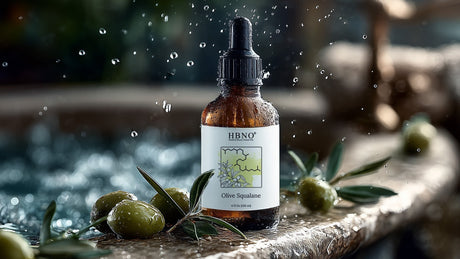In today's increasingly competitive aromatherapy and personal care markets, businesses are looking for high-quality ingredients that can meet both consumer expectations and regulatory requirements. For manufacturers and product formulators, top geranium essential oil blends play a pivotal role in ensuring consistent performance and overall product integrity.
Geranium Essential Oil-distilled from the leaves and stems of Pelargonium graveolens-has long been a staple in fragrances, skincare formulations, and natural product lines. However, its effectiveness in these applications is significantly influenced by the oil's purity, which makes understanding and verifying it essential for B2B buyers.
Why Geranium Oil Purity Matters
For wholesale buyers, contract manufacturers, and formulators in industries like cosmetics, perfumery, and personal care, the purity of Geranium Oil directly affects product quality, consumer trust, and brand reputation. Pure essential oils are free from synthetic additives, diluents, and chemical residues, which means they deliver more consistent aromatic profiles and integrate more reliably into product formulations.
Purchasing adulterated or low-purity oils can compromise not only the performance of the end product but also its safety profile and shelf life. For this reason, understanding geranium essential oil purity isn't just a technical matter-it's a strategic one that can determine the long-term success of your product line.
What Is Considered 'Pure' Geranium Essential Oil?
Pure Geranium Essential Oil is typically steam-distilled from organically or conventionally grown Pelargonium graveolens plants. It should be 100% unadulterated and not mixed with carrier oils, synthetic fragrances, or other essential oils unless otherwise labeled. When labeled as "pure," the oil should maintain its natural chemical composition and exhibit a consistent color, aroma, and viscosity.
In a B2B setting, verifying these qualities requires technical tools and documentation, including certificates of analysis (COAs) and gas chromatography-mass spectrometry (GC-MS) reports. These tools help ensure that the geranium oil purity meets the required industry standards and that the product is suitable for use in high-quality, performance-driven applications.
Top Purity Verification Methods for B2B Buyers
Ensuring geranium essential oil purity involves both scientific testing and business diligence. Here are several methods B2B buyers can rely on:
1. GC-MS Testing (Gas Chromatography-Mass Spectrometry)
GC-MS is the gold standard in essential oil analysis. It breaks down the oil's chemical components and can identify even trace amounts of adulterants or synthetic compounds. When buying Geranium Oil in bulk or wholesale quantities, always request the GC-MS report from your supplier to validate its composition.
2. Certificates of Analysis (COAs)
These documents provide a snapshot of the oil's quality and chemical makeup. A reputable supplier should provide a COA that includes information on major constituents, such as citronellol, geraniol, and linalool-naturally occurring compounds found in high-quality Geranium Oil.
3. Organoleptic Testing
Though subjective, organoleptic testing involves evaluating the oil's aroma, color, and texture by experienced professionals. Pure Geranium Essential Oil typically has a rosy, slightly minty fragrance and a thin consistency. Any off-smells or discoloration can be a red flag for dilution or contamination.
4. Third-Party Certifications
Certifications like USDA Organic, ISO, or Ecocert can provide further assurance about the oil's sourcing, handling, and processing methods. While not a guarantee of purity, these certifications reflect a supplier's adherence to established quality control standards.

Red Flags to Watch Out for
When sourcing Geranium Oil in large volumes, it's essential to stay alert to potential signs of adulteration or poor quality. Some of the most common issues include:
-
Unusually Low Prices: If a price seems too good to be true, it likely reflects diluted or synthetic blends.
-
Inconsistent Aroma or Appearance: Variability from batch to batch can indicate poor quality control or inconsistent sourcing.
-
Lack of Transparency: Suppliers who are unwilling or unable to provide GC-MS reports, COAs, or origin details should be treated with caution.
-
Generic Labeling: Always look for complete botanical names and batch numbers. "Geranium Oil" alone is insufficient-look for labels specifying Pelargonium graveolens.
How Geranium Oil Is Typically Used in B2B Applications
While consumers may use Geranium Essential Oil in diffusers or DIY blends, B2B buyers typically source this oil for commercial manufacturing. Common product categories include:
-
Fragrances Oils and Perfumes
-
Skincare and Beauty Products
-
Aromatherapy Blends and Massage Oils
-
Soap and Candle Manufacturing
-
Botanical Extracts for Hair and Body Care
Because Geranium Oil has such wide utility in scenting and natural product formulation, maintaining geranium oil purity is crucial for consistency and product performance. A single batch of impure or altered oil can disrupt entire production cycles and result in returns, rebranding costs, or reputational harm.
Sourcing Tips for B2B Buyers
To maintain high standards and avoid costly mistakes, here are a few best practices for sourcing Geranium Oil at scale:
1. Partner with Reputable Suppliers
Choose suppliers known for quality and transparency. Look for companies with established credentials, third-party lab testing, and positive industry reviews.
2. Ask the Right Questions
Inquire about the plant's country of origin, cultivation method (organic vs. conventional), distillation method, and batch tracking. These details offer insight into the oil's journey from field to bottle.
3. Sample Before You Buy Bulk
Always test a sample before committing to a large order. This not only gives you an opportunity to test purity but also helps assess compatibility with your product line.
4. Stay Informed on Regulations
Different countries have different requirements for essential oil usage in products. Staying informed on regional guidelines ensures compliance and smooth international distribution.
Conclusion
Purity is essential when sourcing Geranium Essential Oil for commercial use. It ensures regulatory compliance, product consistency, and customer satisfaction-key to your brand's success.
By understanding purity factors and sourcing from trusted suppliers like HBNO Bulk, B2B buyers can protect their supply chain and gain a competitive edge in today's quality-driven market. Choose a Private Label Manufacturing Experts offering comprehensive private label and product support.




